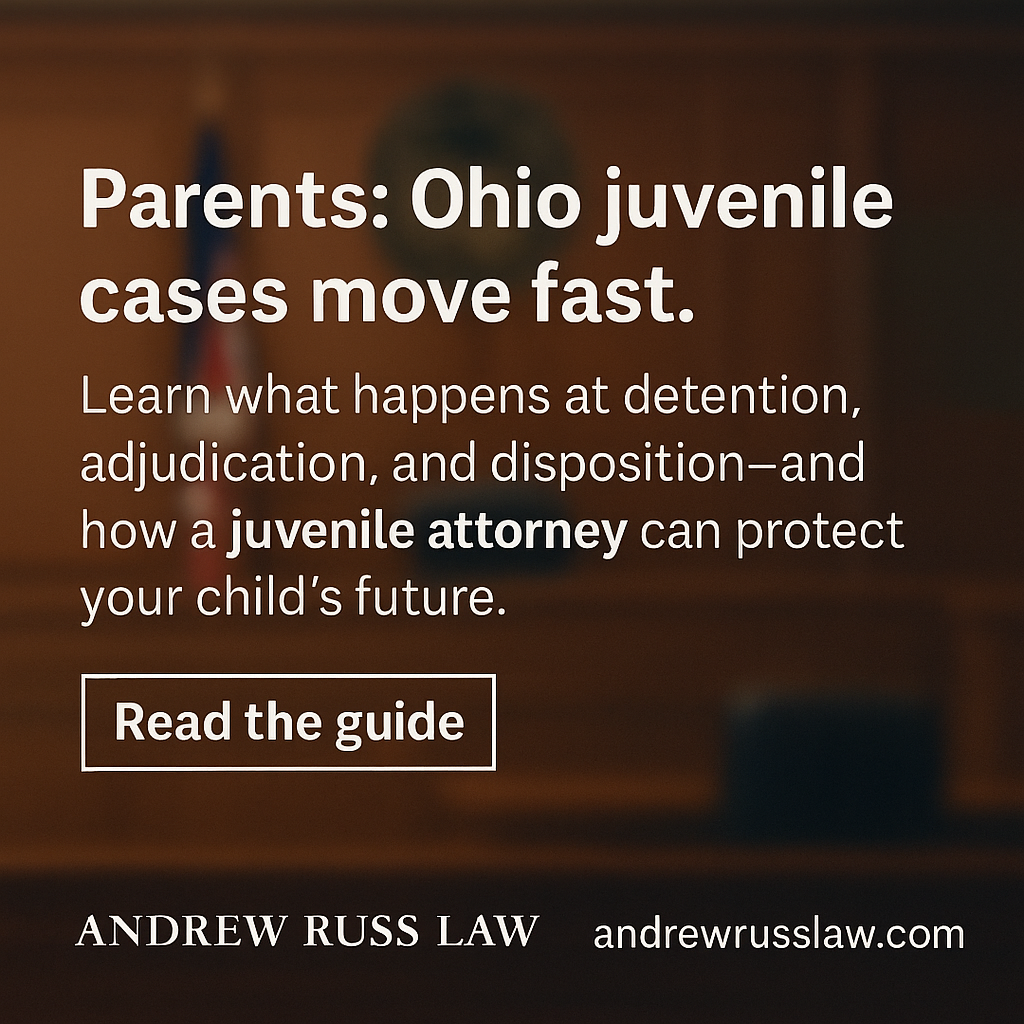Ohio Juvenile Law and Procedure: An Educational Guide for Families, Students, and Parents in Ohio
- Aug 10, 2025
- 7 min read
Updated: Aug 10, 2025
By Andrew Russ, Ohio Juvenile Attorney
Learn Ohio juvenile court basics—hearings, timelines, diversion, dispositions, and record sealing—and how a juvenile attorney can help.

Introduction: What makes Ohio juvenile court different?
Ohio’s juvenile system is designed to protect, correct, and restore—not simply punish. By law, juvenile courts must prioritize a child’s care, safety, and development, and keep families together whenever possible, separating a child from parents only when necessary for the child’s welfare or public safety. (Ohio Laws)
Because the goals differ from adult criminal court, the rules, timelines, and options also differ. Understanding those differences—and acting quickly—can dramatically improve outcomes. An experienced juvenile attorney can guide your family through hearings, negotiate diversion, and protect your child’s record and future.
What cases does Ohio juvenile court handle?
Ohio juvenile courts hear several categories of cases:
Delinquency: Alleged acts that would be crimes if committed by an adult (from misdemeanors to felonies).
Unruly/Status offenses: Conduct that is problematic due to the child’s age (e.g., habitual truancy, curfew). Ohio law defines “unruly child” and “habitual truant.” (Ohio Laws)
Abuse/Neglect/Dependency: Safety concerns involving a child’s care or environment, including when a child is “dependent” through no fault of the parent. (Ohio Laws)
Juvenile traffic and certain custody/support matters when properly certified to juvenile court. (Ohio Laws)
Most cases are decided by a judge or magistrate—without a jury—except “serious youthful offender” matters. (Ohio Laws)

The process, step-by-step (with key deadlines)
1) Intake, complaint, and first appearance
A case typically starts when a complaint is filed. At the first hearing, the court advises the family of the allegations and rights, including the right to counsel (see next section).
2) Detention or shelter-care decision
If a child is detained, a detention hearing must occur promptly—no later than 72 hours after placement or the next court day (whichever comes first)—to decide whether continued detention is necessary. (Supreme Court of Ohio)
3) Adjudicatory hearing (the fact-finding stage)
If the child is in detention/shelter care on a delinquency charge that could be committed by an adult, the court generally must hold the adjudicatory hearing within 15 days after the complaint is filed (subject to limited continuances and different timing if a Serious Youthful Offender sentence is pursued). Abuse/neglect/dependency adjudications must be held within 30 days of filing, with limited extensions up to 60 days for good cause. (Supreme Court of Ohio)
Proof standards:
Delinquency (and most unruly/traffic cases): the court must find the allegations beyond a reasonable doubt. This stems from both Ohio statute and U.S. Supreme Court precedent. (Ohio Laws, Justia Law)
Abuse/Neglect/Dependency: the standard is clear and convincing evidence. (Ohio Laws)
4) Dispositional (sentencing) hearing
If the court finds the allegations proven, it moves to disposition (what happens next). In abuse/neglect/dependency, the dispositional hearing must occur within specific deadlines and, if not held within 90 days (subject to a narrow extension), the complaint must be dismissed without prejudice. (Supreme Court of Ohio, The First District Court of Appeals, CivicLive)
Your child’s core rights (and why counsel matters)
Right to counsel: In Ohio juvenile proceedings, children have the right to an attorney, and courts appoint counsel if the family cannot afford one. (Ohio Laws)
Counsel and waiver rules: Juvenile rules underscore the right to counsel and set conditions around any waiver, reflecting the importance of legal advice before a child gives up rights. (Supreme Court of Ohio)
Right to remain silent on delinquency/unruly allegations is recognized during proceedings like detention hearings. (Supreme Court of Ohio)
Victims’ rights: Courts must allow victims to be heard before disposition as required by Ohio law and the Ohio Constitution. (Supreme Court of Ohio)
A juvenile attorney ensures these rights are protected, identifies defenses, challenges improper police or school investigations, pursues diversion when available, and works to safeguard future education, scholarships, licensing, and employment.
Diversion in Ohio: keeping kids out of court
Diversion redirects youth away from formal court processing into community-based solutions (e.g., restorative programs, counseling, tutoring, or service). Research supports diversion as an effective response; importantly, diversion can occur before a complaint is filed or any time prior to initial hearing. Ohio’s Supreme Court has created toolkits and a Juvenile Diversion Task Force (launched in 2024) to promote best practices and consistency across counties. (Supreme Court of Ohio)
A juvenile attorney can advocate for diversion eligibility, assemble mitigating materials (grades, activities, treatment engagement), and negotiate program terms that avoid a formal adjudication and minimize collateral consequences.
Possible outcomes (dispositions) in delinquency cases
Ohio law gives judges a wide range of dispositional tools tailored to rehabilitation and community safety. Depending on the case, the court may:
Place a child on community control (probation), with conditions such as school attendance, counseling, curfew, and community service. (Ohio Laws)
Order restitution, fines, or other sanctions proportionate to the offense and family means. (Ohio Laws)
Impose driver’s license suspensions for certain offenses. (Ohio Laws)
Commit a child to the Department of Youth Services (DYS) for secure confinement in serious cases, with minimum terms set by statute. (Ohio Laws)
In the most serious cases, prosecutors may seek to transfer (or “bind over”) a juvenile for prosecution in adult court. The statutes define mandatory and discretionary transfers and require specific findings, including probable cause. These decisions hinge on age, the alleged offense category, and other statutory criteria. (Ohio Laws)
A seasoned juvenile defense lawyer can argue for community-based alternatives, challenge unlawful commitments or transfer attempts, and preserve issues for appeal.
Abuse/Neglect/Dependency: safety, services, and permanency
When a complaint alleges abuse, neglect, or dependency, the court focuses on safety and services, not punishment. The court follows strict adjudication and disposition timelines and must make findings about reasonable efforts and, when appropriate, relative placement. Case plans are journalized and updated within set periods. (Supreme Court of Ohio)
Because the stakes include placement, visitation, and parental rights, families should consult counsel early. A juvenile attorney can challenge inadequate investigations, seek relative placement, protect visitation, and ensure the agency meets its legal obligations.
Protecting the future: sealing and expungement of juvenile records
Ohio provides a path to seal eligible juvenile records and later expunge them. With limited exceptions (e.g., certain serious offenses), courts may promptly seal records upon application or on their own motion. Five years after a sealing order—or by the person’s 23rd birthday, whichever comes first—the court must expunge the sealed records (destroying them). (Ohio Laws)
Sealing and expungement can remove significant barriers to college admissions, housing, military service, scholarships, and jobs. A juvenile attorney can assess eligibility, prepare filings, and appear at hearings to help clear a young adult’s record.

How a juvenile attorney helps—step by step
Rapid response at intake: Contact the court or probation quickly, request discovery, and steer the case toward diversion where appropriate.
Detention advocacy: Argue for release to a parent or guardian at the 72-hour detention hearing, presenting a safety plan (school schedule, supervision, counseling). (Supreme Court of Ohio)
Investigation & defenses: Obtain school and police records, camera footage, and witness statements; explore competency, duress, misidentification, or Fourth/Fifth Amendment issues.
Adjudicatory hearing prep: Enforce the statutory and rule-based timelines; prepare motions to suppress, witness lists, and mitigation. (Supreme Court of Ohio)
Disposition strategy: Present a comprehensive plan (treatment, tutoring, mentorship), seek community control conditions tailored to the child, and avoid unnecessary custody or confinement. (Ohio Laws)
Post-disposition relief: Pursue record sealing/expungement and, in appropriate cases, challenge transfer or commitment errors on appeal. (Ohio Laws)
Frequently asked questions (Ohio-focused)
Q1: Will my child have a jury? Usually no. Juvenile cases are decided by a judge or magistrate. A limited exception exists for “serious youthful offender” proceedings. (Ohio Laws)
Q2: How fast do things move after arrest or detention? If your child is detained, the court must hold a detention hearing within 72 hours or the next court day. If the case proceeds, adjudication has strict timelines depending on the case type and custody status. (Supreme Court of Ohio)
Q3: What is “diversion”? Diversion is an agreement to complete services or programming instead of formal court processing, often keeping a record clean if completed. Ohio’s Supreme Court has emphasized diversion best practices and created a statewide task force to improve consistency. (Supreme Court of Ohio)
Q4: What are typical penalties for delinquency? Outcomes range from probation/community control and community service to restitution, license consequences, and—only in more serious cases—commitment to DYS. (Ohio Laws)
Q5: Can we clear a juvenile record? Often, yes. Eligible records can be sealed, and later expunged automatically after set time frames. Certain offenses are excluded. Ask a juvenile attorney to evaluate eligibility and timing. (Ohio Laws)

Related Resources on Andrew Russ’s Blog

Columbus & Athens focus: where we work and what we do
From Franklin County (Columbus) to Athens County (Athens) and neighboring courts, local practices differ—especially on diversion, probation conditions, and scheduling. A local juvenile attorney understands each court’s preferences, probation department processes, and available services (mentoring, therapy, tutoring, restorative justice), and can tailor a strategy accordingly.
Call Andrew Russ—Ohio juvenile attorney
If your family is facing a school-based allegation, a delinquency charge, or an abuse/neglect investigation, prompt legal help matters. Our office provides:
Emergency detention-hearing representation
Diversion advocacy and negotiation
Adjudication defense and motion practice
Disposition planning focused on education and services
Record sealing and expungement assistance
Call today to schedule a confidential consultation with a juvenile attorney serving Columbus, Athens, and surrounding Ohio communities.
LINKS:







